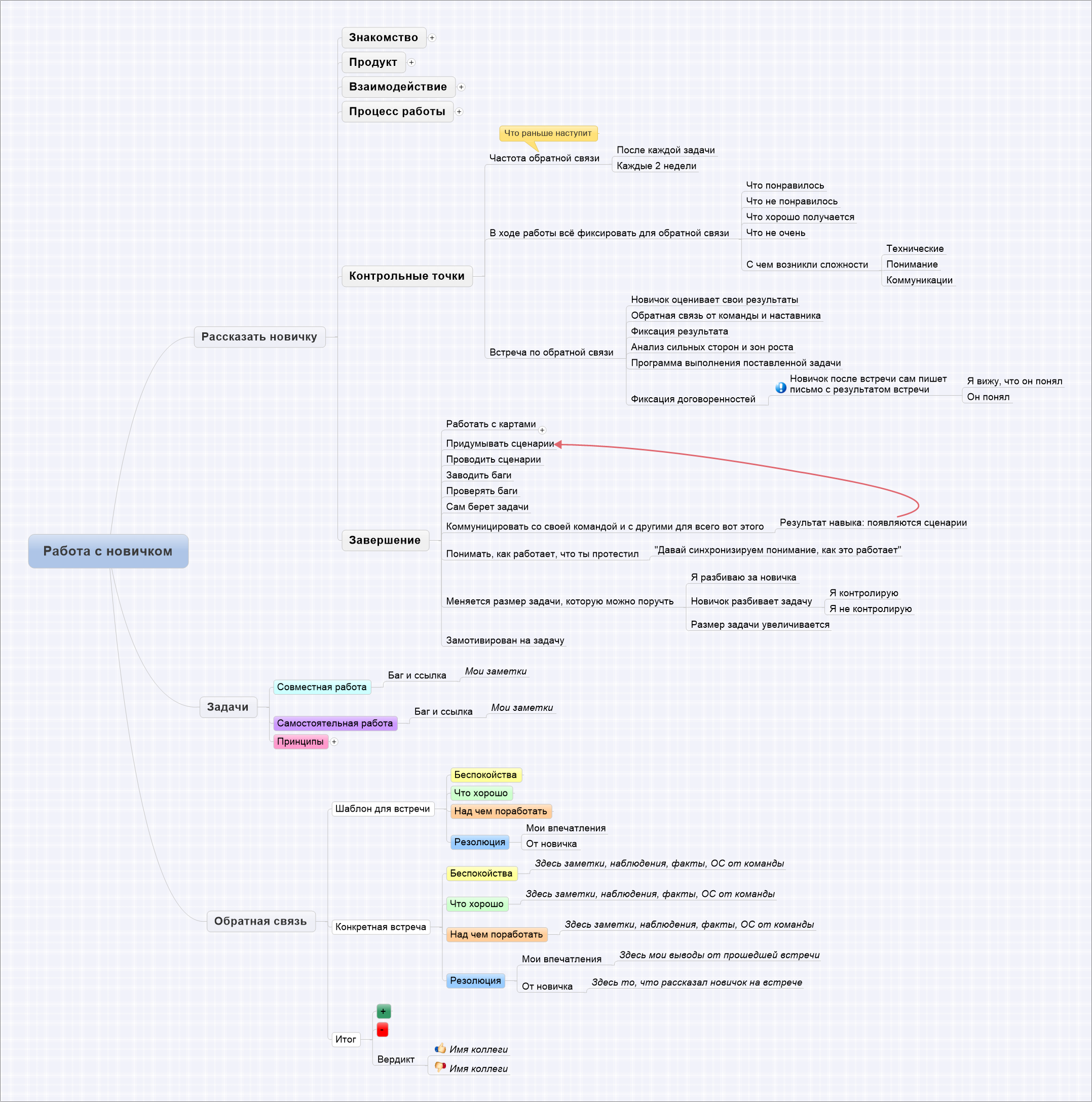"Calendar tester" for October. Feedback: how it happens
In the October Calendar of the Tester, Arina Razgonyaeva, Yulia Agafonova and Lena Zyryanova will tell how they collect feedback. We are subjective, evaluating ourselves, so we ask others about ourselves. You can meet with a colleague over a cup of coffee and find out what he thinks about you. You can approach more thoroughly and conduct a survey of 360 degrees . We use both options and some other practices. About them today and talk.
Practices from tmlida Arina
It is important for me to know not only the “average temperature in the ward”, but also the situation of each of my guys. One-on-one meetings help me in this. I spend two kinds of meetings with each: semi-annual and one-on-one meetings.
Semiannual meetings
On them, we and the employee sum up his work in the past six months and discuss plans for the following. For such meetings, it is important to prepare well. I ask my guys to write me in advance how they have lived these half a year. To help send a letter with an exemplary plan:

Thanks to a preliminary letter to the meeting itself, I already have a few opinions: mine, the employee himself and his colleagues. Such training allows a more objective assessment of the work of a person. Another good thing is that when I find out about the desires and goals of an employee in advance, I can put them on the project plan, choose the task that is desirable for the employee and talk about it at a semi-annual meeting.
Do they write about me? They write and write different things, both good and bad. And this is priceless, I think everyone understands why :).
One-on-one meetings
Semiannual meetings are about global plans, and at one-on-one meetings we talk about current affairs and evaluate progress on semi-annual goals. I spend them every two months - during this time there is always something that can be discussed. And even for half a year something can be forgotten, and such meetings allow us to avoid it.
I like to start the meeting with the question: “How are you in the mood?” It helps to tune in an informal way. The conversation can go in any direction depending on the answer.
One practice helps me to assess the level of employee satisfaction with different aspects of work. Given: a list of aspects of work - tasks, workplace, team, salary, professional and career growth. Please rate each aspect as a percentage. If this is not 100%, then I ask why he appreciated that way and that he could raise the assessment.

This tool allows you to understand the overall emotional background in the team and see for each employee his motivators. After some time, you can retest and see if something has changed or not.
The main question remains: how can you finally force yourself to hold such meetings?
There is no magic, you just need to take and do :). Book each meeting in the calendar for the next six months and set reminders to have time to prepare.
Feedback through the eyes of tester Julia
So, the team leader outlined the time when to give feedback. Why do I need it, an employee? This is a reason to stop and analyze their work. After all, usually we do not think about whether we are moving in the right direction. And yet this is an opportunity to make work more comfortable and interesting.
So what is it worth writing about?
- On the tasks and goals that you set the team leader or manager. I analyze each item, drawing conclusions, to what extent the task was completed or what prevented it from performing.
- About project tasks for the last six months:
- Rate your role in these tasks, where everything went well, and where you could do better.
- What tasks allowed to pump.
- Which were interesting, which, on the contrary, did not like and why.
- Which are hard and why.
- On the processes: the shortcomings, the difficulties in communications.
- About future features: what features I would like to take in the upcoming six months.
- On the growth zones: in which direction you want to develop, which skills to pump.
- And also about the fact that you have an inconvenient workplace, the sun shines in the monitor or next door the door slams all the time and makes it difficult to concentrate :).
Try this exercise and then go and tell your team leader about it :).
About colleagues
This is a subtle point. Someone may think that assessing colleagues is not our task.
I am based on my impressions. Understanding that a colleague will receive feedback from the team leader, I am always ready to write about the best qualities I have noticed.
For example:
- Sergey is always ready to help deal with complex issues.
- Max is generally handsome, because he wrote down a very handy utility and made life easier for everyone.
I always rejoice when a timlid tells what colleagues have written, be it positive or negative feedback. Positive means that I am moving in the right direction, that there is a benefit from me and from my work. If my weaknesses are noticed, we discuss with the team leader how to fix it. It motivates. And after six months, it is interesting to learn about the progress.
Therefore, I myself write not only about the strengths of colleagues, but also about the difficulties in working with them. Negative moments are always harder to write than something good. When describing a situation, I try to point out exactly what the difficulties were, to describe the facts, without going over to accusations against my colleague.
About team lead
About the team leader to write the most difficult. First, it is difficult to evaluate his work, after all, this is somewhat different specificity. And secondly, you need to say everything in the eyes. If the feedback about colleagues is simpler (the team leader decides in what form to convey the feedback), then there is no such option.
I came to the aid of a report. Test the team leader from Tatiana Sintina on SQA Days 20. He is about what function the team leader should perform. Now I focus on some of the points in this talk.
In particular, I rate:
- interaction with me personally:
- as far as I have enough feedback;
- as far as the team leader defends my interests, contributes to my personal development;
- to what extent are my goals reasonable and clear; - interaction with other managers and team management:
- how much other managers consider the opinion of my team leader;
- how authoritative is the team leader within the team;
- as far as I understand, as a member of the team, the direction in which we are moving.
Do managers / team leaders need feedback from the team? I think it is necessary. A look at their work on our part can give them some food for thought and help them keep their finger on the pulse.
Lena and her map
My name is Lena and, in addition to testing, I help new testers adapt to our team. Learning a beginner is a difficult and incomprehensible task. And I have one favorite approach to any complex and incomprehensible task - I make a map (intellect card), where I record and store information. In the picture there is a mapping template in which I will record information on a specific person.

At the very beginning of work, I warn the newcomer about the “Checkpoints” - meetings for feedback throughout the trial period. I ask him in the course of his work to record difficulties, successes and thoughts in a convenient place and form. At the same time already at the meeting I will check how he coped with this work task;).
In addition, I tell the newcomer the criteria for the probation period, they are listed in the "Completion" branch. This not only helps the novice to understand what to strive for, but also helps me to monitor the growth of the novice and his development.
In the “Tasks” branch, I fix the bugs and features that we worked on in pairs, and which the novice did on his own. For each such task, I note my thoughts and observations in the course of work. It turns out that I am preparing for feedback in advance, even while working on the task.
Shortly before the meeting, I ask colleagues to write my impressions about the newcomer. In the map there is a block “Feedback” for specific meetings, where I sort my ideas and information from colleagues in three categories: “Anxiety”, “What is good” and “Over what to work”.
If everything is clear with the second and third categories, here “Anxiety” is in some sense ephemeral. Here I include various truly subjective impressions that need to be confirmed or refuted at a meeting. For example, if a doubt arises: does the novice understand what is expected of him?
Since I have little experience in holding tete-a-tete meetings, I invite a team leader to them: it is usually he who sets the tone for the conversation and guides it in a constructive way. And I reinforce the conversation with facts and examples that I have “sewn up” to the map. One of the life hacks that I learned from the team leader is first of all asking the newcomer about his impressions. In fact, already at this stage of the conversation, certain conclusions can be drawn, which I am fixing - where? That's right, in the map, in the “Resolution” block.
And then I ask the newcomer to write the results of the meeting. So he better everything will be deposited in my head, and I will see what he endured. To the next checkpoint, everything repeats.
The last branch for the final decision at the end of the probationary period, Itog, remained in the map. Here, I also record feedback from colleagues, but this time with their personal decision whether or not to take a novice to the team.
The intelligence card not only allows me to sort everything out, but it also turns out to be a convenient tool for gathering feedback on a beginner in one place.
Total. The practice of collecting feedback is a lot. You can use any. Regardless of whether you are a manager, a tester or a mentor, collecting feedback and giving it to your colleagues is a great chance to grow. Share what methods your team uses? How do you feel about collecting feedback?
List of calendar entries:
Try a different approach
Reasonable pair tested
Feedback: as it happens
Optimize tests
Read the book
Testing analysts
tester should catch a bug, read and organize Kaner dvizhuhu
load the service
metrics at the service of QA
test the safety of
Know Your Customer
Disassemble Backlog

